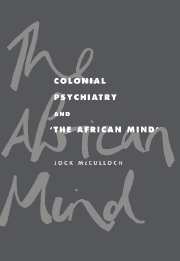Book contents
- Frontmatter
- Contents
- Acknowledgements
- 1 Introduction
- 2 Psychiatry and colonial practice
- 3 Some contemporary reviews of colonial mental health systems
- 4 Towards a theory of the African mind
- 5 Theory into practice: Carothers and the politics of Mau Mau
- 6 African intelligence, sexuality and psyche
- 7 The African family and the colonial personality
- 8 The elements of orthodoxy
- 9 From psychiatry to politics
- 10 Conclusion
- Notes
- Bibliography
- Index
2 - Psychiatry and colonial practice
Published online by Cambridge University Press: 04 December 2009
- Frontmatter
- Contents
- Acknowledgements
- 1 Introduction
- 2 Psychiatry and colonial practice
- 3 Some contemporary reviews of colonial mental health systems
- 4 Towards a theory of the African mind
- 5 Theory into practice: Carothers and the politics of Mau Mau
- 6 African intelligence, sexuality and psyche
- 7 The African family and the colonial personality
- 8 The elements of orthodoxy
- 9 From psychiatry to politics
- 10 Conclusion
- Notes
- Bibliography
- Index
Summary
No matter where they practise psychiatrists deal with two main groups of patients: those whose suffering is due to brain dysfunction and a second group who are ill because of a dysfunction of a psychic nature. Although this distinction is frequently blurred it is reflected in distinct medical philosophies, neuropsychiatry and psychoanalysis. Each school tends to minimize the importance of its rival, not least by reducing the apparent incidence of the disorders which constitute the field of its competitor.
British psychiatry, at the beginning of the twentieth century, was dominated by neuropsychiatrists. Freud had found refuge in London at the end of his life, and his presence had given encouragement to the psychoanalytic community, but analysts were few and had little influence on the British mental health system. Until the Mental Treatment Act of 1930, most patients were admitted to hospitals under certificate. The Act was intended to encourage voluntary treatment and to promote psychiatry as a curative rather than a custodial discipline. This change in emphasis was encouraged by the introduction of new technologies such as insulin coma, metrazol and psychosurgery. It was perceived as important by the profession for psychiatrists to be able to compete in terms of philosophies, procedures, and equipment with colleagues in other specialities. The National Health Service Act of 1946 and the Mental Health Act of 1959 enhanced the salaries and status of psychiatrists.
- Type
- Chapter
- Information
- Colonial Psychiatry and the African Mind , pp. 9 - 28Publisher: Cambridge University PressPrint publication year: 1995



